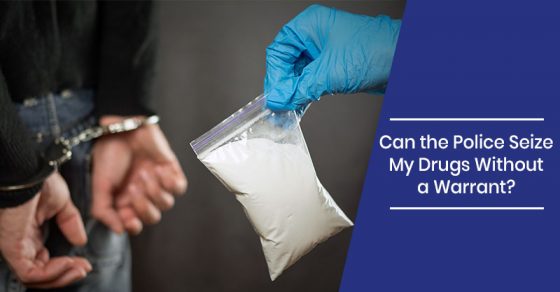Can the Police Seize My Drugs Without a Warrant?

Blog by Cassandra Beaulac and Arun S. Maini
The answer? In three situations, the answer is Yes. Those scenarios are:
- If the drugs are in “plain view”;
- If the police are conducting a search “incident” to arrest;
- If the police are facing “exigent circumstances”.
What is the “plain view” doctrine that allows police to seize evidence?
The plain view doctrine allows the police to seize evidence that comes into their sight by accident.
For example, in a recent case, a man from B.C. named Amanpreet Gill answered a knock at the door. He was carrying an unsealed package which fell at his feet. A brick of cocaine worth $100K fell out of the package. Unfortunately for him, the people at the door were the police. The police did not have a warrant for the cocaine, but because it was in “plain view”, they were permitted to seize it, and Mr. Gill spent two years in jail regretting that he answered the door so quickly.
But the police cannot search people or dig through their stuff until they find evidence “in plain view”. To be allowed to seize such evidence, there are three requirements:
- First, the police officer must be lawfully authorized to be in the area where the evidence is in plain view;
- Second, it must be obvious that the item in plain view is illegal contraband or evidence of a criminal offence;
- Lastly, the evidence must have been inadvertently and unintentionally discovered.
For example, if a police officer has a warrant to search a residence for a firearm, and upon entry to the residence, she sees a brick of cocaine on the dining-room table, the officer can seize this without a warrant because she:
- Was lawfully authorized to be in the area (she had a warrant to search the residence for a firearm) where the cocaine was in plain view;
- The cocaine was in plain view and was immediately apparent that it was alikely an illegal controlled substance; and
- The cocaine was inadvertently discovered by chance: the police did not know it was there. If they had known it would be there, they would have had to seek permission in the warrant to seize it.
What Are “Exigent Circumstances”?
Exigent circumstances refer to a situation where the police have the grounds to get a warrant, butit would be impracticable to get a warrant before seizing the item. There has to be an element of “urgency” to the police action.
For example, where the police are chasing a suspect they have the grounds to arrest, and the suspect runs into his home. In that case, the police could be entitled to pursue him into the residence to arrest him, even though they do not have a warrant to search the home.
Another example: police enter a home without a warrant, following a disconnected 911 call. The police enter the home because they are required to do so to verify the safety of the occupants. If they see a gun or a baggie of drugs or a counterfeiting machine on the dining-room table, they are allowed to seize it.
Section 11(7) of the Controlled Drugs and Substances Act (“CDSA”) defines the circumstances where it would be “impracticable” to obtain a warrant:
“the exigent nature of the circumstances are such that taking time to obtain a warrant would seriously undermine the objective of police action – whether it be preserving evidence, officer safety of public safety.”
What Is a Search Incident to Arrest?
If the police have the grounds the arrest you, they are allowed to search you and your immediate vicinity as part of that arrest. That search, however, must be for a valid purpose, such as:
- To protect the police against a weapon;
- To protect the evidence from being destroyed;
- To discover evidence.
For example, if the police lawfully arrest you for drunk driving, they can search you before putting you in the back of a police cruiser, to make sure you don’t have a weapon or a baggie of cocaine for the after-party. They can also search your car before towing it, to make sure there is no evidence of the offence there, such as a half empty bottle of booze and a receipt showing you just bought it an hour ago. They can also do an “inventory” search to list the contents of the car, to protect themselves against a complaint that the cellphone you left in the glovebox went missing, for example.
To determine whether the search incident to arrest was legitimate, your lawyer will need to examine the circumstances of that search. Was it for a legitimate purpose? Was it truly part of the arrest or did it go beyond the scope of what is permitted? For example, when the police arrest a suspected drunk driver and search him, they can’t search the other passengers in the car in the process. Your lawyer can advise you if the search was legal, or whether it strayed out of bounds.
If your drugs have been seized (with or without a warrant), or you are facing criminal charges and need the advice of an experienced and skilled lawyer to help you through the legal process, call The Defence Group for a free consultation at 877-295-2830.
Cassandra Beaulacis a recent graduate of the University of Windsor Law School
Arun S. Maini is a criminal lawyer and former prosecutor with over 20 years of experience.


